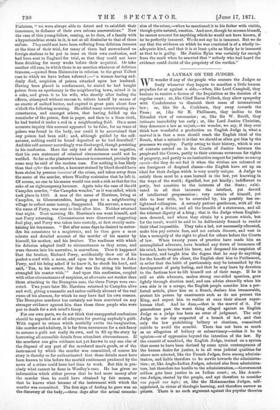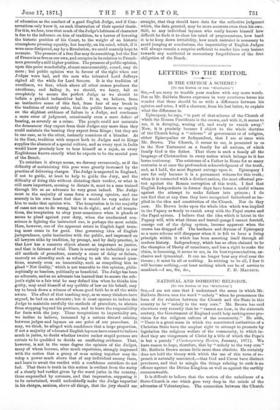A LAYMAN ON THE JUDGES.
WE wonder if any of the people who censure the Judges so freely whenever they happen to manifest a little human prejudice for or against a side,—when, like Lord Campbell, they hesitate to receive a decree of the Inquisition as the decision of a regular court ; or, like Chief Baron Pollock, they allow sympathy with Confederates to diminish their sense of international law ; or, like Sir A. Cockburn, they sway towards the Press ; or, like Sir R. Phillimore, they incline to the Ritualist view of ceremonies ; or, like Sir W. Bovill, they intimate incredulity too early ; or, like Lord Justice Christian, they denounce a law as unjust,—we wonder, we say, if they ever think how wonderful a production an English Judge is, what a marvel it is that a man should reach the English ideal of the Bench, what a miracle it is that we should so often get him by the processes we employ. Partly owing to their history, which is one of contests carried on in the Courts of Justice between the people and the Crown, partly to their extreme reverence for rights of property, and partly to an instinctive respect for justice as among equals—for they do not feel it when the victims are coloured or are foreigners of despised classes—the English have set up an ideal for their Judges which is very nearly unique. A Judge to satisfy them must be a man learned in the law, yet knowing in the ways of the world ; dignified, but yet kindly ; indifferent to party, but sensitive to the interests of the State ; culti- vated in all that interests the intellect, yet devoid of intellectual prepossession ; very certain of himself, yet able to bear with, to be overruled by, his possibly less en- lightened colleagues. A serenely patient gentleman, with all the learning of a divine, and all the breadth of a statesman, and all the tolerant dignity of a king ; that is the Judge whom English- men demand, and whom they obtain by a process which, but for the result, would be said to be deliberately framed to render their ideal impossible. They take a lad, not necessarily educated, make him pay certain fees, and eat certain dinners, and vest in him a monopoly of the right to plead for others before the Courts of law. When twenty years of practice have made him an accomplished advocate, have brushed any down of innocence off his mind, have brazened his brow, and deepened his suspicion of humanity, and taught him the dogma that he may do anything for the benefit of his client, the English elect him to Parliament, in order that the habit of partizanship may be intensified by the development of party feeling, and that he may learn by devotion to the factions how to lift himself out of their range. If he is still an able advocate, makes strong one-sided speeches, goes lightly through election mud, and can advise shrewdly when his own side is in a scrape, the English people consider him a per- fected article, place him on a Bench, declare him irremovable, protect his person by enactments such as do not protect the King, and expect him to realize at once their almost super- human ideal. And he does,—that is the marvel of it. For generations past the worst thing alleged against an English Judge as a judge has been an error of judgment. The only Judge in our day suspected of a breach of law, and that only the law prohibiting bribery at elections, committed suicide to avoid the scandal. There has not been so much as an allegation of bribery or subserviency—unless it be to opinion—or of oppression beyond the intention of the law. By the consent of mankind, the English Judge, trained on a system that seems to have been devised by some cynic contemptuous of the human desire for justice, is in all true judicial qualities far above men selected, like the French Judges, from among adminis- trators, and liable therefore to be servile towards the administra- tion; or, like Anglo-Indian Judges, selected also from administra- tors, but therefore too hostile to the administration,—Government seldom gets bare justice in an Indian court; or, like Ameri- can Judges, elected by the people, and apt therefore to consider vox populi vox legis ; or, like the Mohammedan Judges, self- appointed, in virtue of theologic learning, and therefore narrow as priests. There is no such argument against the popular theories
of education as the conduct of a good English Judge, and if Con- servatives only knew it, no such illustration of their special thesis. For it is, we fear, true that mach of the Judge's loftiness of character is due to the influence on him of tradition, to a horror of lowering the historic position of his Court, to the weight of an historic atmosphere pressing equably, but heavily, on his mind, which, if it were once dissipated, say by a Revolution, we could scarcely hope to recreate. The pressure of a free Bar may do something, but the Bar of France is as free as our own, and occupies in its relation to French- men generally a still higher position. The pressure of public opinion, upon this point wonderfully, almost unaccountably, sound, may do more ; but public opinion was in favour of the right when our Judges were bad, and the men who tolerated Lord Jeffreys sighed all the while for Lord Somers. It is the tradition of excellence, we fear, which above all other causes produces the excellence, and failing it, we should, we fancy, fail as completely to secure the perfect Judge as we should to inflate a pricked indiarubber ball. It is, we believe, from an instinctive sense of this fact, from fear of any break in the tradition of stately calm, that the public fastens so eagerly on the slightest evidence of failure in a Judge, and condemns a mere error of judgment, occasionally even a mere defect of bearing, as severely as a crime. The people could not maintain the demeanour they expect from their Judges any more than they could maintain the bearing they expect from Kings ; but they are in one case, as in the other, instantly conscious of a blunder. As in the East, tradition with respect both to Judges and to Kings supplies the absence of a special culture, and as every ryot in India would know precisely how to bear himself as a rajah, so every Englishman knows exactly what he expects to be the mental pose of the Bench.
To outsiders it always seems, we daresay erroneously, as if the difficulty of maintaining this pose were greatly increased by the practice of delivering charges. The Judge is expected in England, if not to guide, at least to help to guide the Jury, and the difficulty of doing this without dictating their verdict, or what is still more important, seeming to dictate it, must to a man trained through life as an advocate be very great indeed. The Judge must in the majority of cases form a strong opinion, and can scarcely in his own heart feel that it would be very unfair for him to make that opinion win. The temptation is in the majority of cases not one to do wrong, but to do right ; and of all tempta- tions, the temptation to obey your conscience when it pleads or seems to plead against your duty, when the uneducated con- science is fighting the instructed one, is perhaps the most subtle. Here, however, one of the apparent errors in English legal train- ing must come in for good. One governing idea of English jurisprudence, quite instinctive with the public, and impressed on all lawyers alike by tradition, by precept, and by daily practice, is that Law has a concrete object almost as important as justice, and that is fairness of trial. There is scarcely an imbecility in our old methods of procedure, scarcely a cause of delay or failure, scarcely an absurdity such as refusing to ask the accused ques- tions, scarcely even an immorality, such as compelling him to plead "Not Guilty," which is not traceable to this opinion, philo- sophically so baseless, politically so beneficial. The Judge has been an advocate, and as an advocate has learned that to secure the sub- ject's right to a fair trial he may defend him when he thinks him guilty, may avail himself of any quibble of law on his behalf, may try to break down a witness of whose good faith he is all the while aware. The effect of that teaching may, as so many thinkers have argued, be bad on an advocate ; but it must operate to induce the Judge to maintain carefully the methods of procedure, to abstain from stepping beyond his province, and to leave the responsibility for facts with the jury. These temptations to impartiality are, we incline to believe, increased by a serious discord existing between judges and laymen on one point of our procedure. It may, we think, be alleged with confidence that a large proportion, if not a majority of educated English laymen have ceased to believe much in juries, to doubt whether twelve rather stupid persons are certain to be qualified to decide on conflicting evidence. That, however, is not in the same degree the opinion of the Judges, many of whom become, after much experience, strongly impressed with the notion that a group of men acting together may de- velop a power much above that of any individual among them, and learn to await the verdict with a confidence outsiders do not feel. That there is truth in this notion is evident from the rarity of a clearly bad verdict given by the worst juries in the country, those empanelled by coroners, and that impression, supposing it to be entertained, would undoubtedly make the Judge impartial in his charges, anxious, above all things, that the jury should see
straight, that they should have data for the collective judgment which, the data granted, may be more accurate even than his own. Still, to any individual layman who really knows himself how difficult he finds it to clear his mind of prepossessions, how hard it is to keep down irritability, how much restraint is necessary to avoid jumping at conclusions, the impartiality of English Judges will always remain a surprise sufficient to render him very lenient towards any accidental or momentary forgetfulness of the first obligation of the Bench.



































 Previous page
Previous page